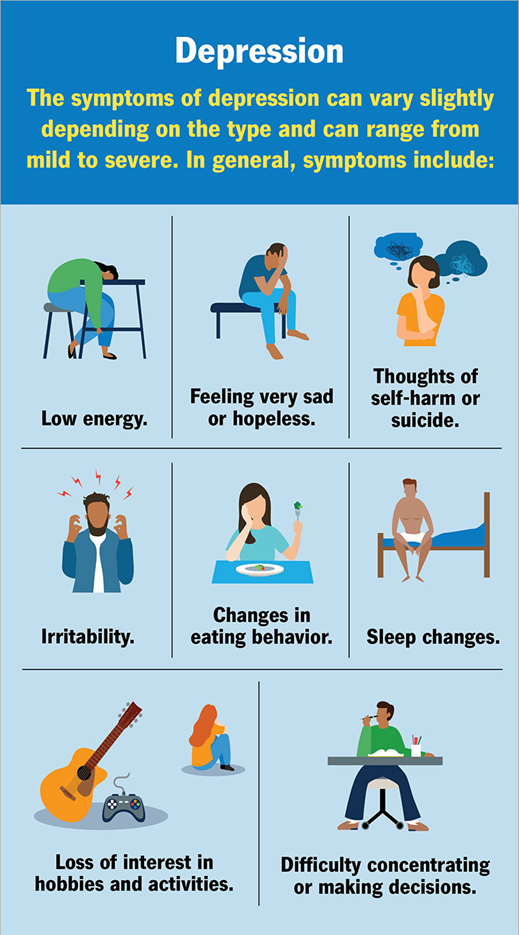A nurse is leading a grief support group for bereaved clients. Which of the following client statements should the nurse report to the provider as an indication of clinical depression?
"I feel like I'm angry at the whole world right now."
"I don't feel anything but numbness anymore."
"I don't know how I could cope if I didn't have my family's support."
"It'll be a long time before I'm happy again."
The Correct Answer is B
Choice A reason:
Feeling angry at the world is a common reaction to grief and loss. Anger is one of the stages of grief and does not necessarily indicate clinical depression. While it is important to monitor the client's emotional state, anger alone is not a definitive sign of depression.
Choice B reason:
Expressing a sense of numbness and an inability to feel emotions is a significant indicator of clinical depression. This symptom, known as anhedonia, reflects a loss of interest or pleasure in most activities and is a core feature of major depressive disorder. It is crucial to report this to the provider for further evaluation and intervention.
Choice C reason:
Acknowledging the importance of family support is a positive coping mechanism. This statement indicates that the client recognizes their support system, which is beneficial for managing grief. It does not suggest clinical depression.
Choice D reason:
Feeling that it will take a long time to be happy again is a normal part of the grieving process. Grief can be prolonged, and it is natural for clients to feel that their happiness is distant. This statement alone does not indicate clinical depression

Nursing Test Bank
Naxlex Comprehensive Predictor Exams
Related Questions
Correct Answer is C
Explanation
Choice A reason:
While not bathing for two days can be concerning, it is not uncommon for clients experiencing mania to neglect personal hygiene. However, this alone does not necessarily indicate a severe issue that requires immediate reporting.
Choice B reason:
Speaking in rhyming sentences, also known as clang associations, is a symptom of mania. While it is indicative of the client's current mental state, it is not as critical as severe neglect of basic needs like eating.
Choice C reason:
Reporting eating only twice in the past week is a significant concern. This indicates severe neglect of basic nutritional needs, which can lead to serious physical health complications. It is crucial to address this immediately to prevent further deterioration of the client's health.
Choice D reason:
Making inappropriate sexual comments is a common symptom of mania due to disinhibition. While it is important to manage this behavior, it is not as immediately life-threatening as severe malnutrition.
Correct Answer is C
Explanation
Choice A reason:
Electroconvulsive therapy (ECT) is not typically used to reduce the frequency of seizures. In fact, ECT induces controlled seizures as part of its therapeutic process. Therefore, a reduction in seizure frequency is not an indicator of ECT's effectiveness.
Choice B reason:
While ECT can be used to treat various psychiatric conditions, it is most commonly and effectively used for severe depression. It is not primarily indicated for reducing the frequency of panic attacks. Therefore, a reduction in panic attacks is not a primary measure of ECT's effectiveness.
Choice C reason:
Improvement in manifestations of depression is a key indicator of ECT's effectiveness. ECT is often used when other treatments for major depressive disorder have failed. Patients typically show significant improvement in mood, energy levels, and overall functioning after a series of ECT treatments.
Choice D reason:
Decreased fear of heights, or acrophobia, is not a condition typically treated with ECT. Phobias are usually addressed through therapies such as cognitive-behavioral therapy (CBT) rather than ECT. Therefore, a decrease in the fear of heights is not an indicator of ECT's effectiveness.
Whether you are a student looking to ace your exams or a practicing nurse seeking to enhance your expertise , our nursing education contents will empower you with the confidence and competence to make a difference in the lives of patients and become a respected leader in the healthcare field.
Visit Naxlex, invest in your future and unlock endless possibilities with our unparalleled nursing education contents today
Report Wrong Answer on the Current Question
Do you disagree with the answer? If yes, what is your expected answer? Explain.
Kindly be descriptive with the issue you are facing.
